Are tween girls the profitable music demographic?
I am by no means a music industry veteran, but I’ve worked at a few music tech startups, and there is often this underlying theme from music industry insiders that tween girls are the target market. I’ve often asked why that is, or if there is any proof, and I am often met with a “well that’s just common sense” kind of answer.
It has never made logical sense to me, and all of my life experiences point in a different direction, but being a noob in the industry I just assumed I was old, and it was true.
I decided to take a quick look online for the latest data about music sales, concert attendance, and just anything I could find about the subject. Here is what I found.
A few quick notes: I was looking specifically for information to support the claim that tween girls are the most profitable demographic, but in my heart I thought that was untrue. Also, all of these stats are from the internet - everyone knows the internet is 100% accurate all the time :)
First off lets find out what people are buying / where the money appears to be coming from. This is for sales of recorded tracks (live shows will be later):
US Recording Industry Revenues from Physical (2006 - 2011)
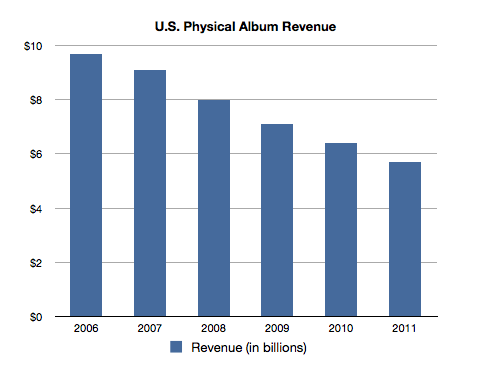
(via grabstats.com)
We can see here that sales of new physical mediums (CD, vinyl, cassette tapes) are on a decline. (On a side note, I wonder what second hand sales are like. I personally buy a lot of second hand music because of the loudness war with newer albums)
US Digital Music Revenues (2006 - 2011)
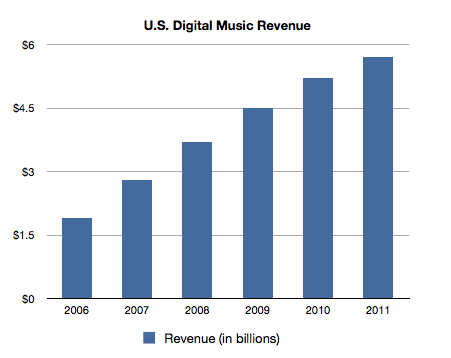
(via grabstats.com)
Digital sales are on the rise. It would seem to me that this is a good place to put focus.
Worldwide Recording Industry Revenues from Online
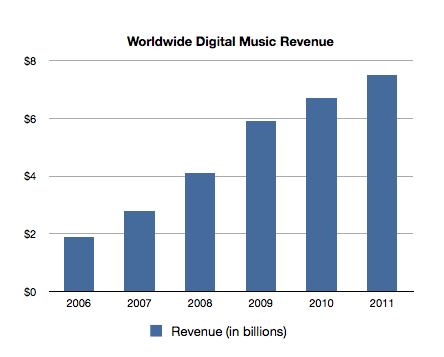
(via grabstats.com)
I couldn’t find stats for world wide physical medium sales, but I didn’t want this to be U.S. centric. So to add a bit of a global frame of reference this is world wide online revenue trend.
So using those graphs above, not only is online revenue on an upward trend, it is now at parity with physical revenue (6 billion dollars).
Ok, so then tween girls must be the ones buying the digital tracks right?
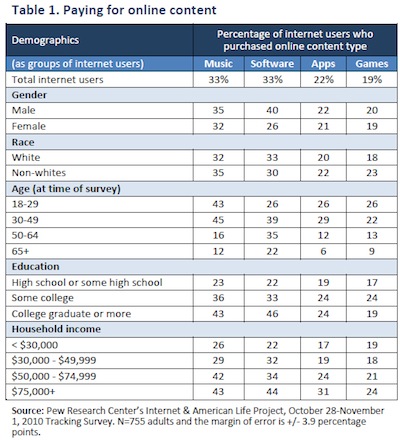
According to Pew Internet in their December 2010 Report 65% of internet users have paid for online content the largest demographic for people who actually pay for online music are:
Non-white 30-49 year old college graduated males with a household income of $75,000, and the vast majority of people paying for online content are people are in the 18-49 year old range.
Now I found this quite interesting for two reasons.
On one hand it makes the “tween girl target market” reasoning seem utterly ridiculous until you factor in that many of these people could be parents that let their kids buy music with their iTunes account. However, most people I know fall into this range. They buy a lot of music, and they don’t have any kids.
On the other hand, it is even less likely that the 18-29 (43% - the second highest group) are parents buying their kids iTunes tracks.
Regardless of trying to read into the numbers though, the fact is that of the people buying content online (according to this single source of course), none of them are tween girls.
Lets take a look a that 18-49 group and see if we can find something that supports them buying stuff for their kids or for themselves.
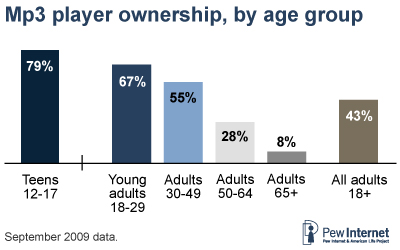
To try to frame the 65% of internet users have paid for online content a bit more, there is another Pew Internet report called Social Media and Young Adults from Feb 2010 that talks about MP3 player ownership. I find this interesting because it might be shedding a bit of light on the buying demographic above. If the 18-49 group above is buying the music, and they own mp3 players, they have a higher probability that they are buying the tunes for themselves.
So, of course this is inconclusive, but if you take it at face value: the 18-49 group actually buys music, and the 18-49 group has the means to play the things they bought.
Who’s more likely to be using lime wire?
Ok, so I am still very unconvinced that the tween market is the holy grail of the music industry when it comes to selling “records”. Perhaps what people are referring to are people who go to live shows.
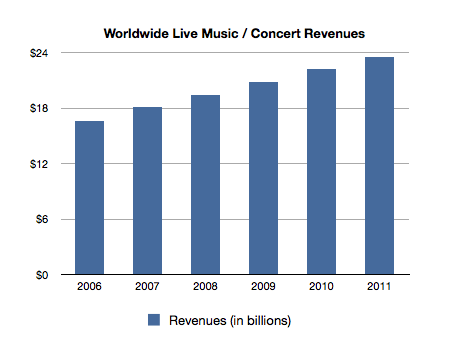
I mean, despite the fact I have never seen a tween at a pub or bar show or at Soundwave or Coachella or any other musical event I have ever been to, $24 billion is a lot of money. Perhaps the majority of that cash is from the Nickelodeon pop fest or Justin Bieber concerts.
I set out to find stats on the demographics of people who go to shows, how much they spend, etc. Sadly, I couldn’t find much of anything.
The only research I could find was an articled called Age and Arts Participation: A Case against Demographic Destiny from February 2011 put out by University of Pennsylvania. The summary:
Mark Stern, University of Pennsylvania, analyzes the relationship between age and arts participation in the Survey of Public Participation in the Arts data for 1982, 1992, 2002, and 2008. The report concludes that age and year of birth are poor predictors of arts participation and that the age distribution of art-goers now generally mirrors that of the U.S. adult population.
So, I am really confused. I cannot find a single bit of evidence anywhere that supports the claim that tweens are even remotely important in the music industry - let alone the target demographic.
In fact, I would go so far as to say that targeting tweens has hurt the mainstream music industry and ostracized the people who not only have the money, but would spend money on music.
I did all this research while I was eating my breakfast today, so it is by no means in depth. If you have any research that can lend any evidence to the claim for or against (perhaps some super secret industry report) please message me on twitter @robrohan
I’d love to see at least some proof of the tween claim. Until then, my theory is “the tween logic” is an outdated hold over from the days of the Beatles. A misplaced wish that Beatle mania can somehow magically come again someday. There is probably a lot more money to be made if the music industry reevaluates their target market and focuses their collective effort a bit differently - otherwise it would appear the music industry is …
Update
Here is an interesting article on the reasoning behind the tweens: Music’s Influence on Culture. This comes by way of an awesome family member. Thanks Katie!
I still have to fully read it, but by scanning the logic in it seems to be along the lines of “If we can get tween demographic to buy music, we’ll be rich”. By that logic though, if you can get the nematode sea-worm to buy music you’d have an insane amount of money. I think most business find who is buying their products, and then cultivate that market - I think I remember something from school about keeping a customer is less costly than finding another… anyway, there appears to be some good information into the reasons behind the tween logic.
Ok, I just finished reading it, and it sounds like most music business people sound to me. It’s very light on the proof, and heavy on the pie in the sky. It talks about how everyone is chasing the tween market, but doesn’t prove that market matters. It talks about how everyone should focus on the tween market because Disney does it.
Everyone should make iPods because Apple is profitable doing it.
Everyone should make hospital beds because KCI is profitable doing it.
So so far the list of reasons for chasing the tween market is:
- Disney, the kids company with the gigantic theme park, makes money doing it.